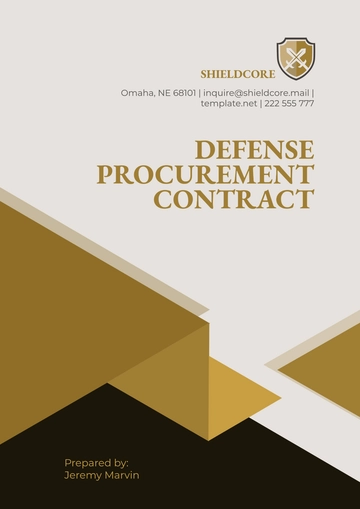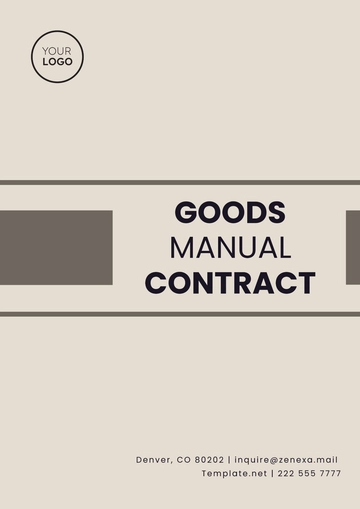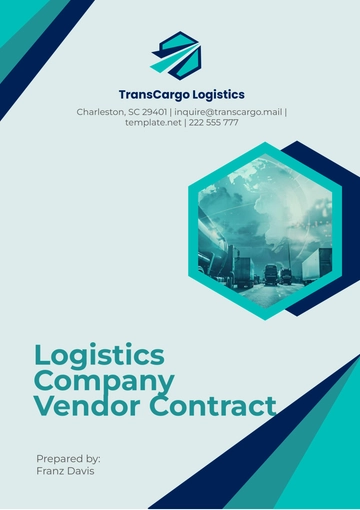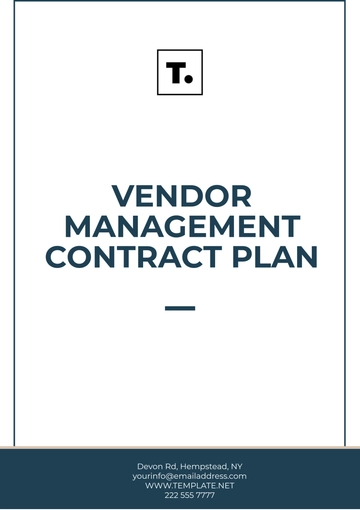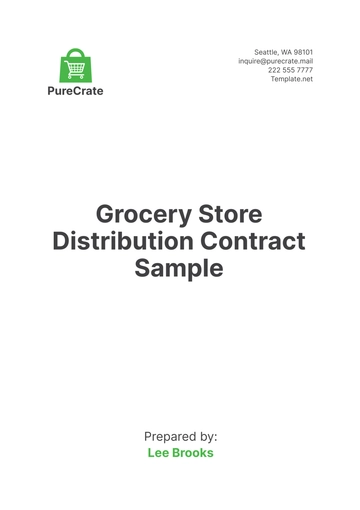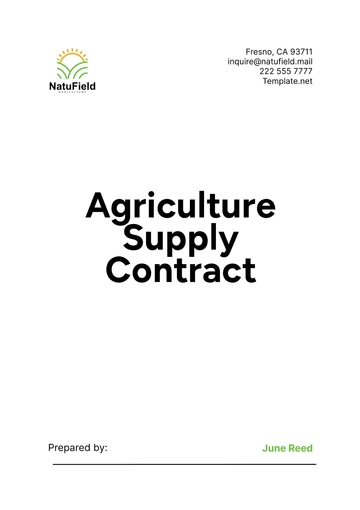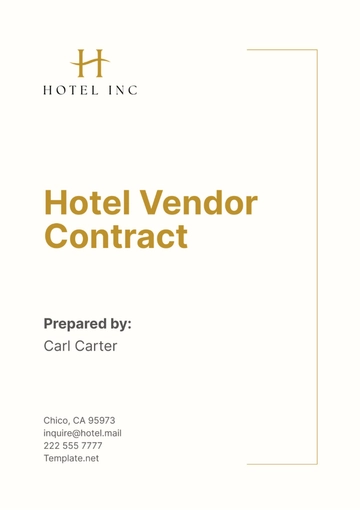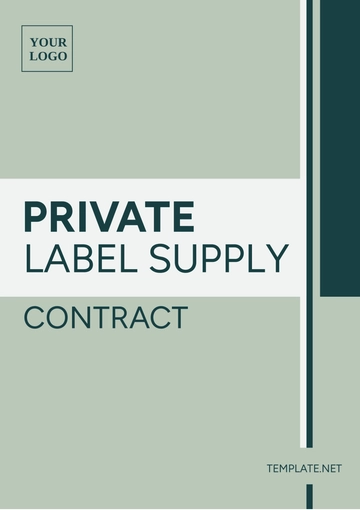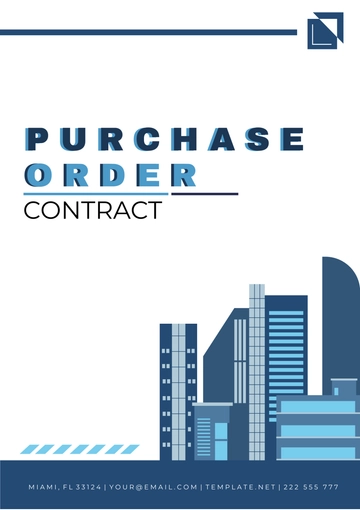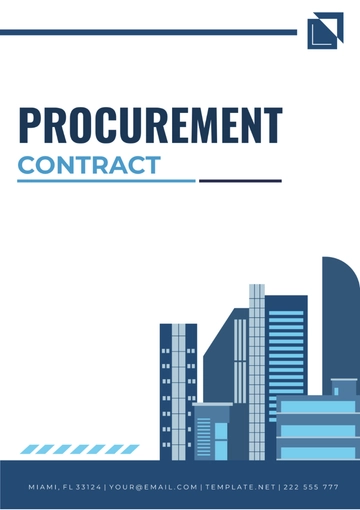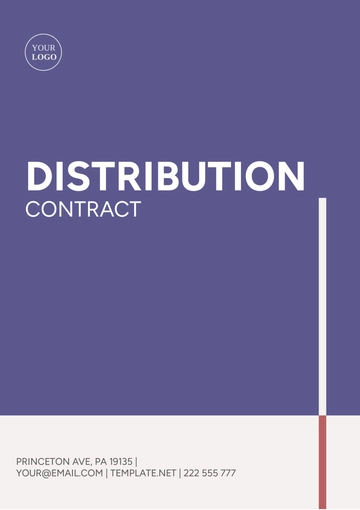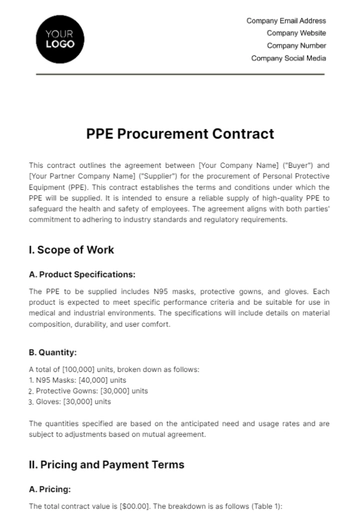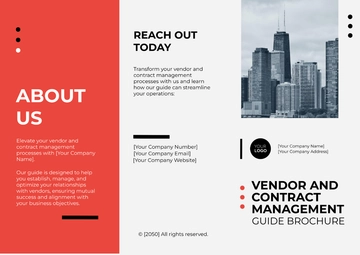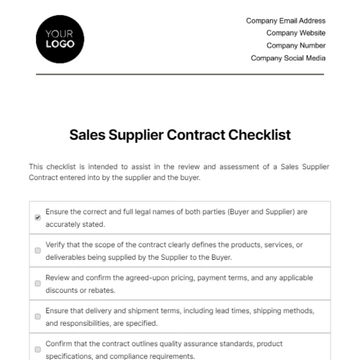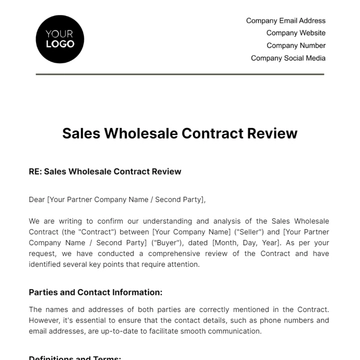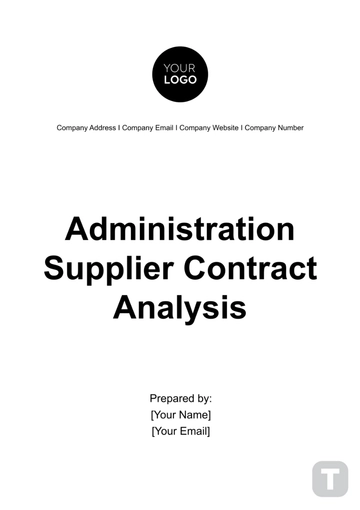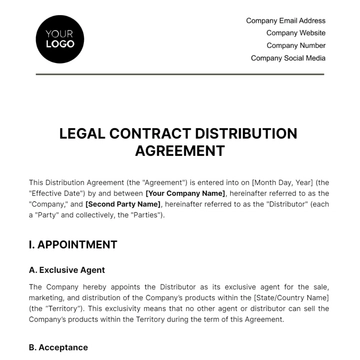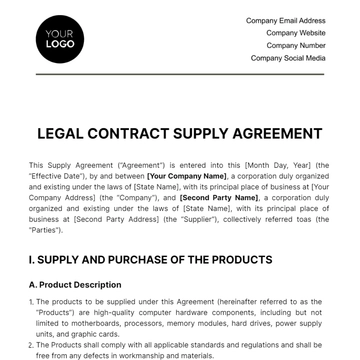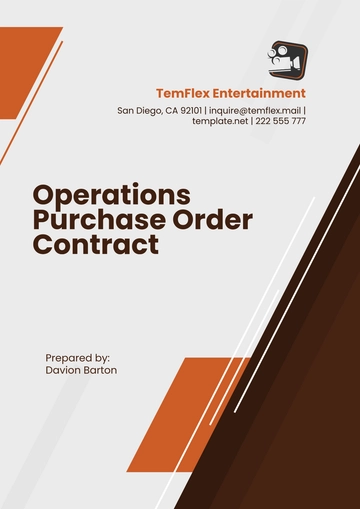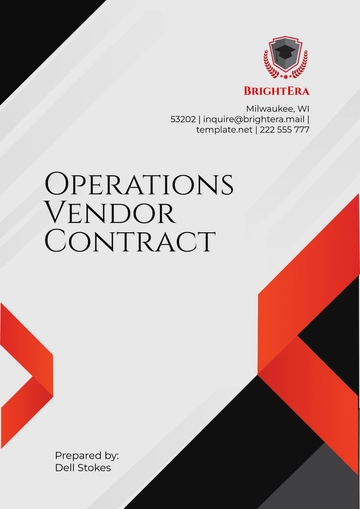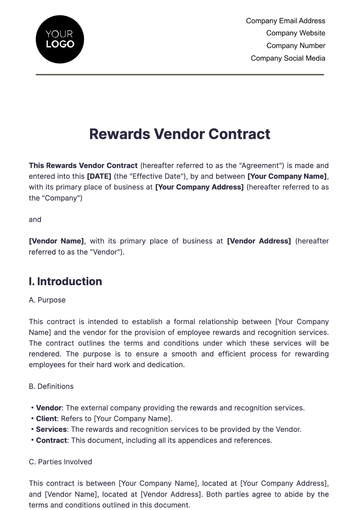Free Vendor Management Contract Plan
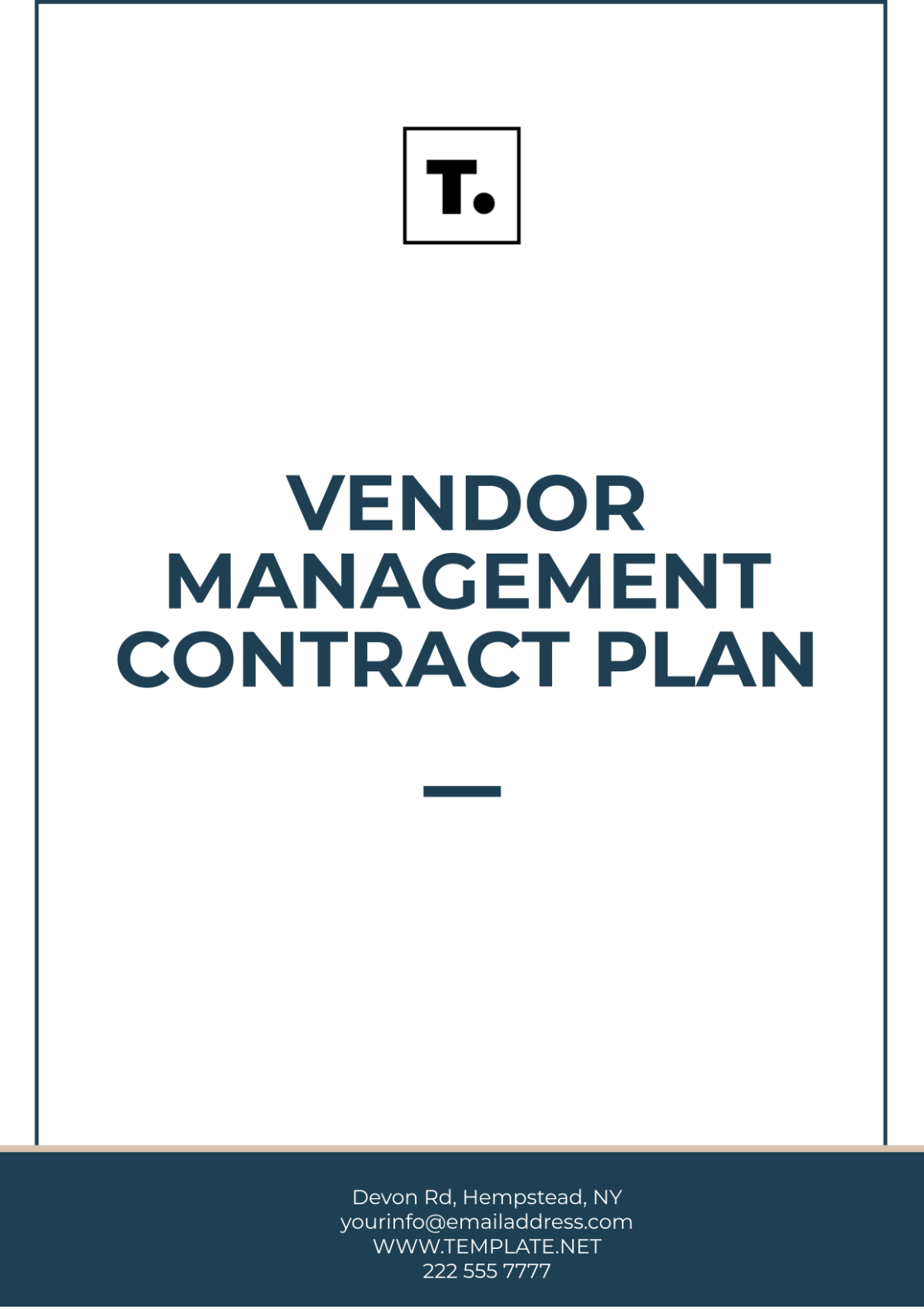
Prepared by: [YOUR NAME]
Company: [YOUR COMPANY NAME]
Date: May 5, 2050
1. Introduction
The Vendor Management Contract Plan provides a comprehensive framework to govern the relationship between [YOUR COMPANY NAME] and its external vendors. The purpose of this plan is to ensure that all vendor engagements are conducted efficiently, with clear performance expectations, risk management strategies, and compliance with legal and contractual obligations. This plan also ensures that vendors are managed in a way that supports the organization's operational, financial, and strategic goals.
2. Objectives
The key objectives of the Vendor Management Contract Plan are:
To establish a standardized process for vendor selection, onboarding, and management.
To ensure vendors meet service levels and performance requirements.
To maintain cost control and value for money in all vendor engagements.
To mitigate risks associated with vendor relationships, including compliance, security, and operational risks.
To provide a clear framework for resolving disputes and managing vendor performance issues.
3. Scope
This plan applies to all external vendors providing goods or services to [YOUR COMPANY NAME]. It covers the entire vendor lifecycle, including selection, contracting, performance management, risk assessment, and contract termination or renewal.
3.1 Vendor Categories
The plan applies to vendors in the following categories:
Goods Suppliers: Providers of raw materials, equipment, or products.
Service Providers: Companies offering professional services, such as consulting, IT support, or maintenance.
Subcontractors: Third-party contractors engaged through the primary vendor.
4. Vendor Selection Process
The vendor selection process is critical to ensuring that the right vendors are engaged to meet the company’s needs. The following steps are included in the vendor selection process:
4.1 Needs Assessment
Before engaging a vendor, the needs of [YOUR COMPANY NAME] must be clearly identified. This includes defining the scope of work, desired outcomes, budget, and any specific requirements.
4.2 Vendor Sourcing
Vendors are sourced through multiple channels, including:
Public tenders: A formal process that invites potential vendors to submit bids.
Existing vendor lists: Pre-approved vendors who have demonstrated performance.
Industry referrals: Reputable vendors recommended by industry partners.
4.3 Vendor Evaluation
Vendors are evaluated based on the following criteria:
Capabilities: The ability to meet the specific needs of the project.
Cost: Competitiveness of pricing while maintaining quality.
Experience: Past performance and relevant expertise.
Compliance: Adherence to legal, regulatory, and ethical standards.
4.4 Contract Negotiation
Once a vendor is selected, contract terms are negotiated, including:
Scope of work
Payment terms
Service Level Agreements (SLAs)
Performance metrics
Penalties for non-compliance or underperformance
5. Contract Management
5.1 Service Level Agreements (SLAs)
Each contract will include SLAs that define the expected level of service from the vendor. These agreements should specify:
Response times
Delivery schedules
Performance targets
Quality standards
5.2 Monitoring and Reporting
Vendor performance will be monitored regularly to ensure compliance with contract terms. The following metrics will be tracked:
Delivery performance: On-time delivery of goods or services.
Quality of service: Adherence to the agreed quality standards.
Financial performance: Cost adherence to the agreed budget.
Compliance: Meeting legal and regulatory obligations.
Monthly or quarterly performance reports will be generated to evaluate vendors. The reports will be reviewed by procurement managers and other relevant stakeholders.
5.3 Risk Management
The following risk management strategies will be employed to mitigate potential vendor-related risks:
Compliance audits: Periodic audits to ensure the vendor meets legal and regulatory requirements.
Contract reviews: Regular reviews of contract terms to ensure they remain aligned with [YOUR COMPANY NAME]’s needs.
Vendor insurance: Ensuring that vendors have appropriate insurance coverage for liability, workers’ compensation, etc.
Disaster recovery plans: Defining the vendor's ability to recover from unexpected events, such as data breaches or natural disasters.
6. Dispute Resolution
In the event of performance issues or contractual disputes, the following process will be followed:
Issue Identification: The issue is documented and communicated to the vendor.
Resolution Meeting: A meeting is held with the vendor to discuss and resolve the issue.
Corrective Action Plan: The vendor submits a plan outlining the corrective measures they will take to address the issue.
Termination: If the issue cannot be resolved, the contract may be terminated by the terms of the agreement.
7. Contract Termination and Renewal
7.1 Contract Termination
Contracts may be terminated under the following circumstances:
Breach of contract: If the vendor fails to meet performance expectations or comply with contract terms.
Mutual agreement: Both parties agree to end the contract.
End of contract term: The contract naturally concludes at the end of its term.
7.2 Contract Renewal
Contracts will be reviewed for potential renewal at least three months before the expiration date. During the review, the vendor’s performance will be assessed, and a decision will be made on whether to:
Renew the contract: If performance has been satisfactory and continued engagement is beneficial.
Renegotiate terms: Adjust the terms to better align with current business needs.
Terminate the contract: If the vendor’s performance has been unsatisfactory or the company no longer requires their services.
8. Roles and Responsibilities
8.1 Procurement Team
Responsible for sourcing, evaluating, and engaging vendors.
Manages contract negotiations and SLAs.
Tracks vendor performance and generates reports.
8.2 Legal Team
Ensures contracts comply with legal and regulatory standards.
Advises on risk management and dispute resolution.
8.3 Finance Team
Monitors vendor payments and budget adherence.
Provides financial performance reports for vendor evaluations.
8.4 Operations Team
Works with vendors to ensure day-to-day performance meets company requirements.
Communicates any operational concerns to the procurement team.
9. Conclusion
This Vendor Management Contract Plan outlines the process for managing vendor relationships, ensuring that the organization benefits from quality services while mitigating risks and maintaining strong vendor partnerships. This plan will be reviewed and updated regularly to reflect any changes in vendor management practices or business needs. By adhering to the guidelines set forth in this plan, the organization aims to achieve greater operational efficiency, cost savings, and vendor accountability.
- 100% Customizable, free editor
- Access 1 Million+ Templates, photo’s & graphics
- Download or share as a template
- Click and replace photos, graphics, text, backgrounds
- Resize, crop, AI write & more
- Access advanced editor
Optimize your vendor relationships with the Vendor Management Contract Plan Template from Template.net. This fully editable and customizable template helps you create comprehensive contracts tailored to your vendor needs. With our AI Editor Tool, you can easily modify terms and conditions, ensuring clarity and professionalism in every agreement. Strengthen your vendor management process today!
You may also like
- Rental Contract
- Contractor Contract
- Contract Agreement
- One Page Contract
- School Contract
- Social Media Contract
- Service Contract
- Business Contract
- Restaurant Contract
- Marketing Contract
- Real Estate Contract
- IT Contract
- Cleaning Contract
- Property Contract
- Supplier Contract
- Partnership Contract
- Food Business Contract
- Construction Contract
- Employment Contract
- Investment Contract
- Project Contract
- Payment Contract
- Student Contract
- Travel Agency Contract
- Startup Contract
- Annual Maintenance Contract
- Employee Contract
- Gym Contract
- Event Planning Contract
- Personal Contract
- Nursing Home Contract
- Law Firm Contract
- Work from Home Contract
- Software Development Contract
- Maintenance Contract
- Music Contract
- Amendment Contract
- Band Contract
- DJ Contract
- University Contract
- Salon Contract
- Renovation Contract
- Photography Contract
- Lawn Care Contract
